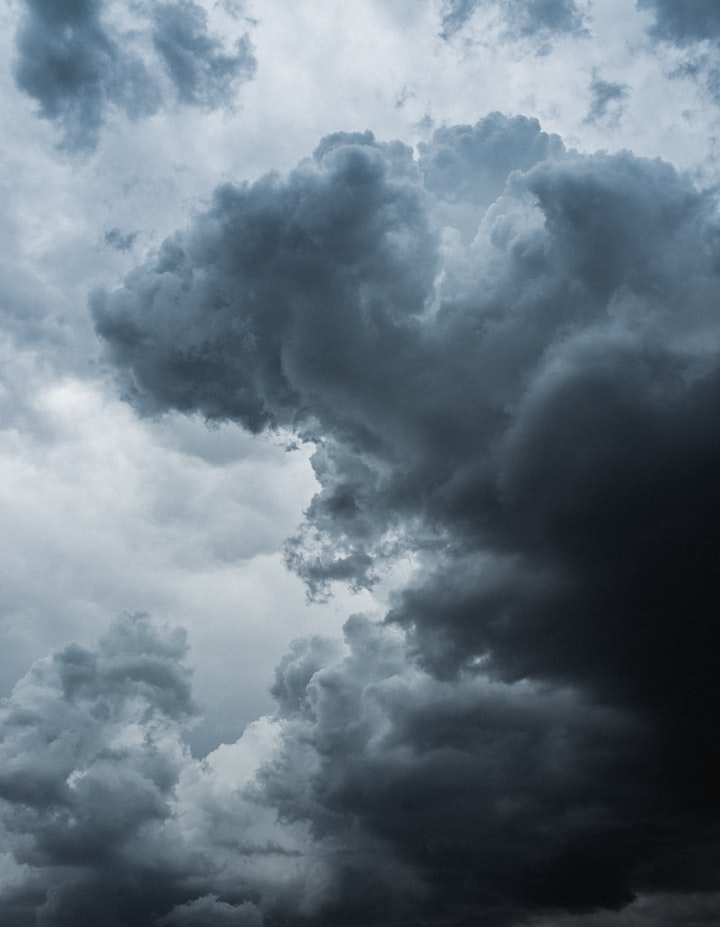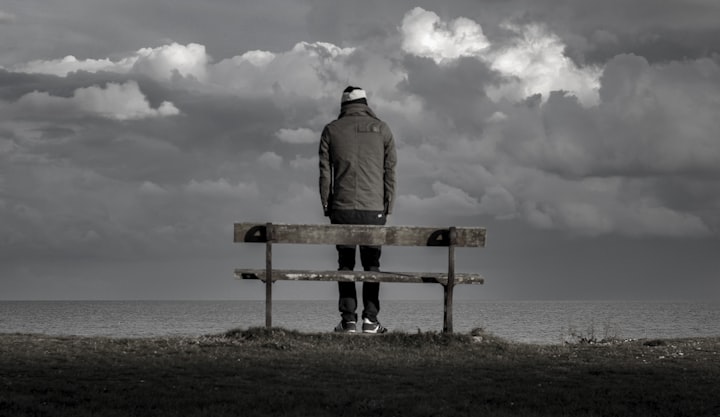Depression is like a Storm
No instance is the same

Content warning: this article talks about anxiety and depression, with some mentions of selfharm and suicide.
...
I’ve struggled with my mental health for a long time. Long before I knew what depression was – what it really was. I felt unsure of myself, second-guessed everything I did, kept my mouth shut because I didn’t think anyone would care what I had to say. I spent days upon days in bed, not seeing the point in even trying to do something, unless I was forced to go to school (and I really needed forcing, I hated school). Given the chance, I’d have never crawled from beneath my duvet. With the door shut and my head buried in the dark I felt safe. I didn’t realise this was not normal.
The Imposter Problem

In secondary school I began to cotton onto the idea that something wasn’t right. Mental health became a popular topic of conversation, but I felt like an imposter whenever I began to suspect I would qualify for a diagnosis. I didn’t think I was important enough to be depressed. I was known as 'the shy girl,’ teachers would beg my parents to encourage me to speak up more in class, and I wanted to, but the thought of raising my hand made my stomach turn. I would shake, reduced to tears, gasping to catch my breath before giving a group presentation. It's normal to get a little nervous, right? But not everyone feels such a sense of foreboding. I was unable to rationalise on my own. It was life or death, and standing in front of those other students, reading slides off of a powerpoint, in my mind, was what would be the end of it all. I later learned this was a panic attack, something I am now very familiar with.
But it wasn’t just constant anxiety. I would come home deflated, exhausted from being on high alert all day. I had a mountain of homework, and though I thought of myself as quite studious, some days I just couldn’t face the pile on my desk. I would try to relax a bit – play a video game, watch some TV, read a book, but every attempt would fail. Intrusive thoughts would begin. ‘What’s the point? This doesn’t accomplish anything. Beating a video game won’t make you a better person. You’re worthless.’ And so I’d slump back into bed, and hide away, sick to my stomach with dread for what I’d have to face tomorrow.
Maybe that should have had me thinking that something was wrong, but again, I’d convinced myself it was normal. In my head every single one of my peers was going through the same thing, but they were still excelling. They had perfect grades, after school clubs, jobs on the weekend. They could beat the dread that loomed above them, and I couldn’t. I spiralled between self hatred and cowardice, hiding from the world and then consequently beating myself up about hiding from the world. A fight where no one would come out victorious.
A Mild Recovery

I don’t remember how I started my anxiety medication. I must have told someone about how I was feeling, or perhaps they noticed and pushed me towards a doctors appointment. Those few years felt like a blur, but what I can remember is my visit to the doctors, sat in his office, filling out a mental health questionnaire, feeling like an imposter all over again.
In retrospect, the questionnaire was very simple. Answer honestly, get an honest diagnosis. I hesitated with every question. Is what I'm feeling really worth leaving a tick in the 'yes' box? Luckily, I found the strength inside myself to be brutally honest about what I was going through, for perhaps the first time ever.
Do you have thoughts about self harm? Tick.
Have you acted on these thoughts? Tick.
Do you have suicidal thoughts? Tick.
Have you acted on these thoughts? Tick.
I ticked yes for nearly every question, but it wasn’t until my doctor looked over my answers that it finally began to sink in. This was not normal. This was not how people were supposed to feel. I had been making my life ten times harder for myself by not opening up about it, by assuming I was weak, by being taken over by illness. I was promptly put on a prescription and sent off to therapy.
And it helped, I think. The anxiety is still there, but it’s more of a dull ache in the back of my brain. I have some control over it, and ways of overcoming panic attacks for when they catch me off guard. I made it through University with only half the amount of shakes I would have had undiagnosed.
But the depression is still there. I know it’s there, which helps me rationalise when I need to. Most days I can get out of bed (Lupus willing) and I can get what I need to done. I still crawl under my duvet and hide, though. I still have days where nothing can pick up my mood. I still have days where I wonder if life is really worth it.
I cannot sit here and say that I’ve found the answer, or that some miracle CBT has cured me. Life has its way of throwing hurdles at you when you least expect them. I’m awful at handling grief; bad news can tip me over the edge. I don’t think I even need to explain what effect the pandemic has had.
What I do know is that to receive help, you need to realise you are worthy of it. Opening up to those closest to me has helped a tremendous amount. People who understand when a wave hits me, who don’t berate me or try to give me the same old ‘it gets better’ advice. They know I’ve heard it all before, they know I’m screaming it like a mantra into my pillow. I can only describe the way my depression hits in one way – it is like a storm, and no instance is ever the same.
Depression is like a Storm

Some days are cloudy. The skies are grey, the mood is low, and though it takes a little more enthusiasm I can still manage, just about.
Some days it rains. Sometimes it drizzles, sometimes it pours, but if I have to go outside and face it, I know an umbrella can keep me dry. The umbrella is my support group, my family and friends who understand, who are there when I need a chat, whether it be about how low I’m feeling, or just a quick something to take my mind off it.
Some days it storms. On those days I do not want to leave my bed. The curtains are closed, the TV is on loud, and I stay where I know I am safe. I do not count these days as a relapse, I no longer blame myself for when they happen. I try to use these days to focus on me. I put life aside for the moment and let myself indulge in what keeps me happy. I order a takeaway, because on those days any food is better than starving. I play a video game, because doing something is better than nothing. I listen to music, or a podcast, or just keep my favourite YouTubers on in the background, because the noise helps me feel less alone without the stress of having to keep a conversation going.
But some days the sun shines. I can go outside, and feel accomplished whilst doing so. I can meet my friends, hold them close and shower them with the love they deserve. I can get my work done, I can write an article or make some progress on my novel. Sunny days are my reason to struggle through the storm.
Using the weather metaphor has helped me keep check of my own progress. In my calender I write what the days 'mental weather' was, and every so often I look back and smile at every small 'sunny' I have managed to write.
Moving Forward

I cannot imagine a life without mental illness, because I cannot remember what one was like, but I do know that the situation can get better, because mine has. It doesn’t happen overnight; it’s not as simple as waiting for a bruise to heal or a headache to go away, but it isn’t hopeless. Never let yourself feel alone. Don’t let yourself feel like an imposter. If you are struggling, speak to someone you can trust. A doctor can help you figure things out, and nine times out of ten if you think something is wrong that is enough of a reason to call.
Everyones recovery is different, and what is slowly working for me may not work for you - but help is out there, I promise.
Mental health is important. Please be kind to your mind.
...
A poem written on a stormy day, in the midst of trying to understand my emotions.
Grief is unpredictable,
no instance is the same,
sometimes it's a drizzle,
other times, a hurricane,
so whilst I'm sitting quietly,
my only company my pain,
pull up a chair beside me,
before it starts to rain.
...
Thank you for reading.
If this article has spoken to you in any sort of way, please consider reading the other mental health pieces on my Vocal profile. You can also find me on Twitter Facebook and Instagram.
About the Creator
Jade Hadfield
A writer by both profession and passion. Sharing my stories about mental health, and my journey to becoming a better writer.
Facebook: @jfhadfieldwriter
Instagram: @jfhadfield
Twitter: @jfhadfield
Fiverr: https://www.fiverr.com/jadehadfield






Comments
There are no comments for this story
Be the first to respond and start the conversation.